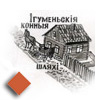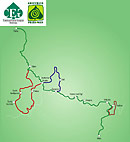PRAGUE-VIENNA GREENWAY
Czech Republic, Austria
"Cultural trail connecting Central Europe"
Trail description
The Prague Vienna Greenway (PVG) is the oldest and most visited Greenway of the Central European Greenways (CEG). The greenway is a network of 100-year-old hiking trails linking Prague, Tábor, Jindřichův Hradec, Slavonice, Znojmo, Lednice-Valtice and Vienna. The backbone trail stretches 470 km along the Dyje River Valley in Southern Moravia and the Vltava River Valley in Southern Bohemia.
The greenway provides the setting for numerous folk and music festivals organized under the slogan “Cultural trail connecting Central Europe”. The backbone trail starts in the central park in Prague's 13th district and leads to the hills of Central Bohemia and the Hussite town of Tabor where the trail follows the river of Luznice through south Bohemian villages with their characteristic 'peasant baroque' architecture to the medieval town of Jindřichův Hradec. The trail leads visitors through the forests of 'Czech Canada', along a former military road which once constituted the Iron curtain, and on to Slavonice, a pearl of renaissance architecture.
The greenway leads to the national Park Podyjí/Thayatal, together with the meandering Dyje/Thaya river, where visitors can get their first taste of excellent Moravian wine at the Sobes vineyard. This is the gateway to South Moravia with its countryside of wine, picturesque little villages, characteristic wine cellar architecture and local folklore traditions. The first stop is the royal town of Znojmo with an impressive castle overlooking the Dyje River valley. In the 13th century, a water canal was built to deliver water to power mills in the area. One of these in Slup is still in working order. The trail leads on to Hevlin, lying on the Austrian border, where there is access to the thermal spas of Laa an der Thaya on the Austrian side of the border.
Mikulov is the former stronghold of the Dietrichstein family with its medieval castle and excellent views of Moravian landscapes, the old town and a Jewish cemetery. Local hiking trails allow visitor to explore surrounding Palava hills. Leaving Mikulov, visitors enter the realm of Liechtenstein family, which built impressive castles, palaces and splendid parks. The Liechtenstein Trail allows visitors to learn about this remarkable heritage.
Valtice is the last stop in the Czech Republic before entering Austria, with its famed palace and wine cellars. A climb up to the Rejstna colonnade rewards visitors with outstanding views of the Lednice – Valtice gardens, parks and monuments. Just across the border, Poysdorf is Austria's unofficial wine capital. Shops sell the wide range of local wines. An experience to remember is staying in farms in Lower Austria's wine quarter (Weinviertel), which specializes in hosting cycle tourists. In Wolkersdorf, visitors can join the rail trail of Dampross und Drahtesel, once serving local farmers, but now used to interpret local historic rail heritage and art. The trail leads to the outskirts of Vienna, where visitors can explore one of Europe's outstanding heritage cities by cycling along the Danube River and associated canals.
There are also several local loops along the Prague-Vienna greenway, including:
- the Rosenberg Family Greenway connecting České Budějovice, Český Krumlov, Nové Hrady mountains and Třeboň;
- the Crafts Greenway which highlights major weaving, black smithing and other workshops between Jindřichův Hradec, Telč and Dačice;
- the Liechtenstein family Trail in South Moravia/Weinviertel, which connects major historic sites (Lednice-Valtice UNESCO site) related to this noble family;
- Other loops include Grasel trail near Slavonice, Trail of Jewish painter Nagl near Telč, Devil´s Load (Čertovo břemeno) Greenway near Sedlec-Prčice/Tábor in Czech Merano or Heritage Trails in Nove Hrady mountains in South Bohemia.
This most popular Greenway in the Czech Republic results from cooperation between non-profit initiatives and commercial activities.
The Prague-Vienna Greenway is managed by the Civic Association Prague-Vienna Greenways (Občanské sdru�ení Greenways Praha-Viden). Key partners in developing and promoting the route are the Greenways-Zelene Stezky Program of the Czech Environmental Partnership Foundation, Friends of the Czech Greenways in New York, as well as the Greenways Travel Club, a local commercial tour operator.
Main tourist attractions and towns along this trail (nature and cultural heritage)
The Prague-Vienna Greenway combines initiatives and activities of nearly 40 NGOs. Visitors can walk or bike between historic towns and villages, visit romantic castles, medieval churches and monasteries, discover old Jewish sites and savor some of the most picturesque countryside in Europe. Visitors encounter magnificent castles, palaces and a wide range of architectural styles, UNESCO sites such as Prague, Lednice-Valtice gardens, castle in Český Krumlov, national park in Podyjí/Thayatal, Thermal spa Laa an der Thaya, Mikulov castle, landscape protected areas of Palava hills, Nove Hrady mountains, Třeboň, Slavonice etc.
General characteristic of the Greenway
Geographical reference mark (major access points/start/end of a greenway)
– Prague: Central park in Prague's 13th district, Tabor, České Budějovice, Brno, Břeclav, Vienna
- Length – 470 km
- Surface – mostly paved in some section the quality of asphalt is good only for trek bikes;
- Percentage of trail/forestry roads/service roads/quiet roads main trail or theme loop - on trails in large cities, forestry roads through forested areas, on former military roads along former Iron curtain and on all-weather quiet roads;
Main users – cyclists, walkers, canoeists, horse back riders and cross country skiers
- Inter-modality possibilities (connections to closest cities/towns and options for using public transport train/bus with relevant web sites or links
Prague, Tabor, České Budějovice, Jindřichův Hradec, Znojmo, Břeclav, Laa an der Thaya, Wien, www.cdrail.cz, www.oebb.at). Each of the towns is a good starting point, they are accessible by public transport (bus and train)
- Available maps and guidebooks
- New Cycling guide book to the Prague-Vienna Greenway 1:100 000 published by Nadace Partnerství in Czech, English and German - parts 1,2,3 (Czech section of the greenway) are already available, with part 4 (Austrian section) to be published in 2007. The guide includes detailed maps, description of the route, profiles, Greenway tips for discovering interesting heritage.
- The section from the Austrian-Czech border to Vienna is also covered by “Radkarte Wein Viertel Ost 1:75 000” published by Weinviertel Tourismus GmbH
- Guides and maps to the Grasel´s Trail, which is part of the Greenway between Slavonice-Dobersberg – published by Slavonická renesanční společnost (Slavonice Rennaissance Society)
- Devil´s Load Greenway maps (Čertovo Břemeno) for cycling, hiking, cross country skiing 1:50.000
Contact to Trail Organization
Prague-Vienna Greenways Association (Občanské sdru�ení Greenways Praha-Vídeň)
Panská 7, 602 00 Brno, Czech Republic, Tel. +420-542422764
www.prahawien.greenways.info (Czech)
www.prahaviennagreenways.org (English – Friends of Czech Greenways)








